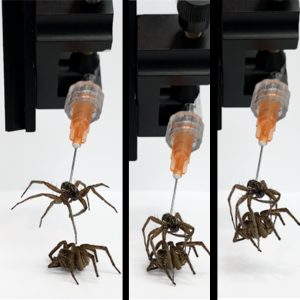
A team of mechanical engineers from Rice University have won an Ig Nobel Prize for the development of what they are calling ‘necrobotics’, the use of dead organisms for use in mechanical devices, such as mechanized grasping tools made from corpses of dead arachnids.
To summon their necrobiotic devices into existence, the team made use of the corpses of dead wolf spiders that were glued to the end of a hypodermic syringe that was used to pump air in and out of the expired arachnids’ exoskeleton; the resulting change in air pressure within the remains caused the legs to flex open and closed, allowing the operator to use the assembly as an eight-clawed gripping mechanism. One might be tricked into thinking this is a shortcut to achieving necromancy.
“It happens to be the case that the spider, after it’s deceased, is the perfect architecture for small scale, naturally derived grippers,” according to Daniel Preston of Rice’s George R. Brown School of Engineering, when their morbid mechanics were first presented in July 2022. Preston’s team also found that the repurposed spider carcasses were comparatively strong, being able to lift objects up to 130 percent of their own body weight.
For these efforts, the team was awarded one of the ten 2023 Ig Nobel Prizes, a satirical award designed to “honor achievements that make people LAUGH, then THINK,” according to the award’s website, bringing attention to scientific achievements that would otherwise go unnoticed by the public, prompting people to “celebrate the unusual, honor the imaginative — and spur people’s interest in science, medicine, and technology.”
Although gluing a dead spider to an air pump might at first seem like a useless device, Preston points out that traditional mechanical grippers will typically involve the assembly of numerous moving parts into a device that requires maintenance and is prone to mechanical failure; necrobotics, on the other hand, is a concept that could provide ready-made biological mechanisms that could eliminate those problems, along with the growing need for electricity for increasingly complex electronic components.
“The research has sparked conversations about how we can respectfully and sustainably source and use biotic materials, and we hope it will continue to generate new ideas for sustainable robotics,” Preston added.
“We’ve learned a lot more in the past year,” remarked team lead Faye Yap, a graduate student with Rice. After discovering that they could articulate a dead spider’s legs using air pressure, “we found we could actuate one of the legs rather than all eight. Actuating individual legs has allowed us to better understand how each of the leg joints behave during actuation. Robotics often takes inspiration from the natural world,” Yap continued.
–“There are robots that swim like fish and crawl like inchworms. Studying spider locomotion in greater detail could also inspire the design of more efficient robots.”
Rice University is also home to the Archives of the Impossible, an archive that preserves records of paranormal encounters such as the vast body of correspondence from experiencers from around the world that was received by Whitley and Anne Strieber, and the subject of 1997’s The Communion Letters. Curating the Archive is Jeffery J. Kripal, who co-authored 2016’s The Super Natural with Whitley, an exploration of phenomena typically considered “supernatural”, and its place in the modern world.
Subscribers, to watch the subscriber version of the video, first log in then click on Dreamland Subscriber-Only Video Podcast link.
I remember reading about this last year. I just felt that it was—wrong, but then a lot of science feels that way. I’ve always been fascinated by archaeology, but I also take issue with our treatment of the dead from the past. If someone is lovingly laid to rest by people from the past, and we find them or dig them up and display them (mummies, for instance), I also think how I would feel if someone like my grandmother was dug up and displayed. It’s less an ‘ick’ factor, but more a lack of respect for customs and beliefs from the past. Even though we gain knowledge, it’s almost a betrayal towards ancestors. Weird, I know…
I always wondered how The Walking Dead would become a reality.
The Crawling Dead?
Next: The Addams’ “Thing”